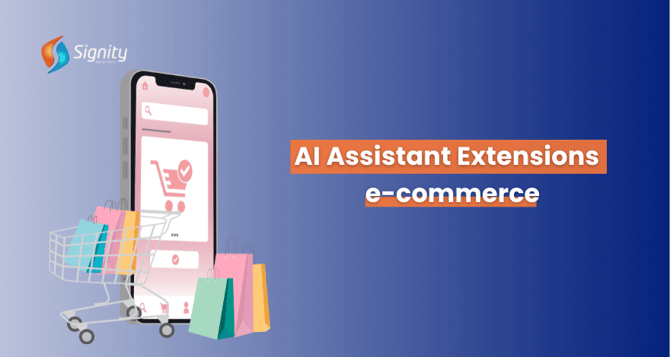AI Assistant Extensions in eCommerce: Simplifying Online Shopping
Elevate your eCommerce platform with the cutting-edge integration of AI Assistant Extensions. Redefine online shopping through seamless, intelligent assistance that simplifies navigation and enhances user engagement. Discover a transformative experience that sets your platform apart, providing unparalleled convenience and customer satisfaction.

In the rapidly evolving landscape of eCommerce, providing personalized and efficient shopping experiences is essential for customer satisfaction and retention. AI-powered virtual assistants are revolutionizing the way users interact with online stores, offering personalized recommendations, answering queries, and streamlining the shopping process. Many Shopify merchants have found that combining AI tools with some of the top Shopify sales optimization apps can significantly enhance their store’s performance. In this article, we'll explore the role of AI assistant extensions in eCommerce and provide a technical implementation for integrating such assistants into online shopping platforms.
Enhancing Customer Experience with AI Assistants
AI assistants leverage natural language processing (NLP) and machine learning algorithms to understand user queries, preferences, and behaviors. By analyzing user interactions and historical data, these assistants can provide personalized product recommendations, assist with product search and discovery, and offer real-time support, enhancing the overall customer experience.
Technical Implementation
Step 1: Choose an AI Assistant Platform
Select an AI assistant platform that offers robust NLP capabilities and integrations with eCommerce platforms. Popular options include Dialogflow, Amazon Lex, and IBM Watson Assistant.
Step 2: Define Use Cases and Features
Identify the key use cases and features you want your AI assistant to support, such as product search, recommendations, order tracking, and customer support. Define the conversational flows and user interactions for each use case.
Step 3: Data Integration
Integrate your eCommerce platform with the AI assistant platform to enable seamless data exchange. This may involve connecting to product catalogs, user profiles, order history, and inventory management systems.
Step 4: Natural Language Understanding (NLU)
Train the AI assistant's NLP model to understand user queries and intents related to shopping. Create and annotate training data sets to teach the assistant to recognize common phrases, product names, attributes, and user preferences.
Step 5: Conversation Design
Design conversational flows and dialogues for each use case, ensuring a natural and intuitive user experience. Implement fallback mechanisms to handle ambiguous or unexpected user inputs.
Step 6: Integration with eCommerce Platform
Integrate the AI assistant into your eCommerce platform's frontend and backend systems. This may involve embedding chat widgets or voice interfaces into the website or mobile app and implementing webhook endpoints to handle backend logic.
Step 7: Testing and Optimization
Conduct thorough testing to ensure the AI assistant performs as expected across different scenarios and user inputs. Collect user feedback and analytics to identify areas for improvement and optimize the assistant's performance over time.
Case Study
Integrating Dialogflow AI Assistant with Shopify
Sign up for a Dialogflow account and create a new agent. Define intents, entities, and training phrases related to eCommerce use cases such as product search, recommendations, and order tracking.
Step 2: Enable Dialogflow Integration in Shopify
Install the Dialogflow app from the Shopify App Store and configure the integration with your Dialogflow agent. Enable features such as live chat support, product search, and order status updates.
Step 3: Customize Conversation Flows
Customize the conversation flows and responses based on your brand voice and user preferences. Implement rich responses with images, buttons, and links to enhance the user experience.
Step 4: Test the Integration
Test the integration between Dialogflow and Shopify to ensure seamless communication and accurate responses. Conduct user acceptance testing to gather feedback from real users and make necessary adjustments.
Conclusion
AI assistant extensions play a crucial role in simplifying online shopping experiences, providing personalized recommendations, and assisting users throughout their journey.
 By leveraging advanced NLP and machine learning capabilities, eCommerce platforms can enhance customer engagement, increase conversion rates, and drive revenue growth. With the right technical implementation and integration, AI assistants have the potential to transform the way users interact with online stores, making shopping more intuitive, convenient, and enjoyable.
By leveraging advanced NLP and machine learning capabilities, eCommerce platforms can enhance customer engagement, increase conversion rates, and drive revenue growth. With the right technical implementation and integration, AI assistants have the potential to transform the way users interact with online stores, making shopping more intuitive, convenient, and enjoyable.













